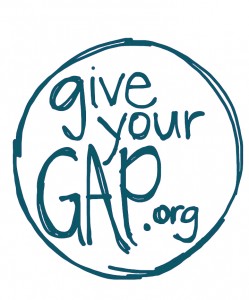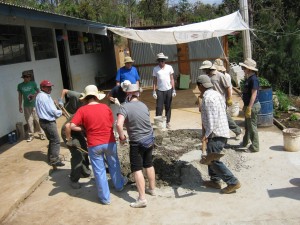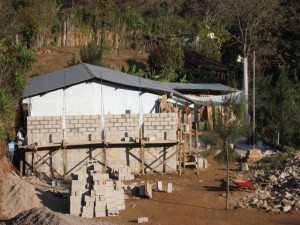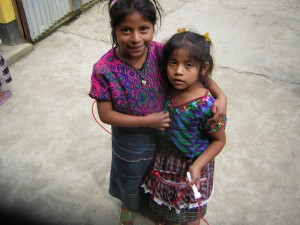Name: Rosalia Mahr
School: Marquette University
Type of Work: Medical/Public Health, Environment/Conservation
Region: Central America
Length of stay: Less than 1 month
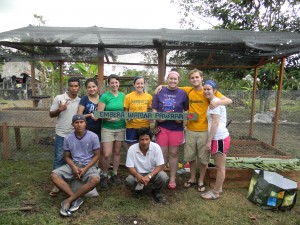
The team’s greenhouse, named “Los gigantes verdes” (written in the Embera language), along with the group of students and the family they worked with.
Tell us about the organization you work for and what you do for them.
I am a member of Global Brigades. There are currently 9 different disciplines within the organization and throughout Marquette University we now currently have 4 of the disciplines. This has been a huge part of my life and my college career for the past 3 years. I have been a part of a Medical/Dental Brigade to Honduras for 2 different years. On these brigades a group of students joins a small group of doctors (from the US and also from Honduras) and sets up a temporary health care area in a few different rural cities. The students help the doctors in translation, intake, triage and in the pharmacy in order to provide health care to these areas that would normally have to drive hours to the nearest hospital. This past year I was blessed enough to be a part of and Environmental Brigade to Panama. During the brigade we built greenhouses for a few families in Piriati (an area a few hours outside of Panama City) along with teaching the people about waste management, organic farming and different ways to take care of the environment around them. One of the key concepts behind Global Brigades is sustainability. Everyone involved is all a part of a larger group for social change working to improve other’s quality of life.
Share a favorite memory.
This past spring when I was in Panama for the Environmental Brigade I was blessed with the family that I was able to work with. The group of students I was with was in charge of building an organic greenhouse for this one family. The wonderful part about this project was the family we were building the greenhouse for was involved in the construction each step of the way. I was helping one of the sons of the family surround the greenhouse in chicken wire. This took some time and allowed for the son and I to talk and find out about each others’ lives. This touched me the most. He shared with me his dreams for the future and where he wants to go with his life. He wants to be able to continue his studies, learn more languages and then, hopefully return to Panama to apply his skills to bettering other people’s lives. He has so much determination in him when he talks about his dreams, and the whole week he worked so hard to help us finish our greenhouse on time. He has the world at his fingertips like anybody else does. Sometimes it is so easy to forget that the people we are serving are people all the same. They have dreams and passion just like the rest of us. The son and I keep contact still via Facebook. I love technology for this reason. He is always checking in to see how I am doing and he gives me constant updates about the progress of the plants we placed in the greenhouse. This is one of my favorite memories of Global Brigades.
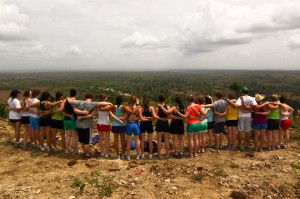
The Global Brigades group standing on a mountain overlooking the community of Piriati Embera in which they were working in Panama.
What have you learned from your experience? How has it affected your long-term goals?
Being a member of Global Brigades has changed my life. I understand this sounds a little cheesy, but it is entirely true. I have known for most of my life that I want to go on to become a physician. If anything has made me a person for others, it has been Global Brigades. It has defined my college career and is a major part of my life. I understand through what I have seen and learned that there is so much more to health care than just physical exams, diagnoses and medications. I have learned how everything is connected (spirituality, environment, physical well-being, etc.) and how important keeping that sense of humanity and connectivity is when working with anyone. Sometimes a smile can make just as much a difference in a person’s life as a medication to cure a sickness. I cannot look at the world in the same way after returning from Panama. I have learned where my priorities and passions lie and I have gained a new and more intense drive to become a physician. Each time I have traveled to Central America I have been extremely tempted to simply stay there and continue with whatever I am doing. But each time I have realized that there is so much more I can do. I can serve even more people and in a more fulfilling manner (for myself and for others) if I return to school and continue my studies to become a physician. I am motivated to be the best version of myself that I can be. These experiences have solidified my goals to become a physician and the serve those less fortunate than I am for the rest of my life. I owe Global Brigades and each person I have worked with so much in helping me learn so much about myself and about the world.
Do you have any advice for prospective gappers?
Be open-minded. You never know what is going to happen and you never know what each thing is going to teach you.

